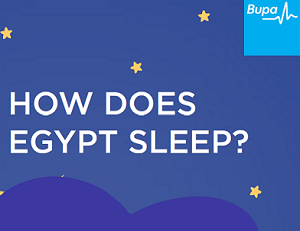- Nearly a quarter of Egypt residents say work related stress is the main factor behind poor sleep, closely followed by home and family worries (20%)
- Almost 30% of Egypt residents said Saturday is the night when they have the worst sleep
- 90% of respondents check work emails before going to bed, with 64% doing so on a regular basis
Sleep experts from Bupa Cromwell Hospital are using World Sleep Day to highlight the importance of good quality sleep and preventing sleep deprivation following staggering research results which revealed only 19% of Egypt residents are getting the recommended eight hours sleep or more each night. Dr Fiona McAndrew, General Practitioner, and Ana Noia, Senior Clinical Physiologist in Neurophysiology and Sleep at the London based hospital, are advising Egypt residents to address sleep related issues to help prevent risks associated with lack of sleep in the future.
According to research commissioned by Bupa Global, a leading provider of international health insurance worldwide, 53% of Egypt residents get 1-2 nights of poor sleep per week, with 12% of respondents reporting less than 5 hours of sleep each night. Research shows that almost a quarter (23%) of Egypt residents claim that poor quality sleep is a result of work related stress, with 30% stating Saturday – the night before starting work – is the night when they get the worst sleep of the week.
Dr McAndrew, who refers to lack of sleep as one of the most common conditions seen by GPs, highlights the importance for people to monitor their sleep and be aware of the impact of lack of sleep on their health.
She said: “Insomnia affects about a third of the global population at some point in their lifetime. Most adults need between seven to nine hours of sleep a night, but many people experience difficulty falling asleep, trouble staying asleep, frequent waking, early morning waking and difficulty getting back to sleep.”
Ana added: “Sleep is just as important for your health as diet and exercise. Sleep is vital to maintaining normal levels of cognitive skills, motivation, physical and mental health. People who do not sleep well often have complaints of memory and attention problems as well as general fatigue and lack of energy. Lack of sleep can also lead to immune deficiency and increased risk of cardiovascular problems.”
Karim Idilby, General Manager for Bupa Global in Africa, India and the Middle East, added: “Our research on sleep and wellness indicates that customers recognise some of the drivers of poor sleep and are looking for solutions to improve their overall wellbeing. A vital element of maintaining good health is working with a leading provider of international health insurance that encourages wellness and gives customers access to expert advice to address any health concerns wherever they are around the world. ”
Sleep facts[1]
- What we do know is that sleep plays a vital role in:
- ‘filing away’ memories in your brain
- improving your ability to learn
- regulating metabolism (the way your body breaks down food into energy)
- reducing mental fatigue
- Humans spend around a third of their time sleeping. If you live to 90, the chances are you will have spent approximately 30 years asleep.
- An adult, on average, needs between seven to nine hours of sleep daily. However, this varies from person to person and decreases as we get older.
- There are 4 stages of sleep: The first phase is called non-rapid eye movement (NREM). This is where you spend most of your sleeping time. This phase has three different stages: N1, corresponds to feeling sleepy, N2 is a light stage of sleep, where you can easily be woken up,N3 is a period of deep sleep. The second phase is rapid eye movement sleep (REM), during which you tend to dream.
- Your sleeping habits can impact your appetite and weight negatively, and make you more susceptible to work accidents and longer reaction times when driving.
- Obstructive sleep apnoea, snoring and difficulties falling asleep or maintaining sleep are frequently seen in the general population.
Tips for better sleep[2]:
- Don’t exercise close to bed time: Exercise is a good way to exhausts your body and mind in a positive way. Just avoid doing any vigorous exercise three to four hours before bed as it elevates adrenaline levels and heart rate, which will make falling asleep harder.
- Bye-bye technology: The blue light emitted by phones, tablets and TVs stops your body from producing the hormone melatonin[3], which is essential for good sleep. If you do not switch off your phone before going to bed, putting it on silent and on “night shift” (mode in which the colours of your display are shifted to the warmer end of the colour spectrum) can help you get better sleep[4].
- Temperature: The environment of the bedroom you sleep in plays a role in your sleep. Your bedroom needs to be cool and dark, as light and warmth slow the production of melatonin, our ‘sleep hormone’.
- 20 minute rule: If you are struggling to sleep, do not stay in bed tossing and turning. You will only get yourself frustrated and anxious, which will make it relaxing harder. If after 20 minutes you are still awake, get up and do something ‘boring’ or relaxing, such as reading or ironing, for 20 minutes then go back to bed.
- Regular bed time: A stable bedtime routine helps the heart filter out stress hormones[5], as well as hormones related to satiety and hunger[6].
- Limited nap time: Limit your nap to 45 minutes or less, especially if you need to do something when you wake up. Otherwise you might drift into REM sleep. Waking up from that stage results in sleep inertia, that grogginess and disorientation that can last for 30 minutes to an hour or more.
- Stop the caffeine: Avoid caffeine for up to 6 hours before bedtime. The effect of caffeine on sleep depends on the amount ingested throughout the day, not just at bedtime. Caffeine consumption can cause extended sleep latency, shorter total sleep time, worsening of the overall quality of sleep and shortening of deep sleep[7].



















